Episodes
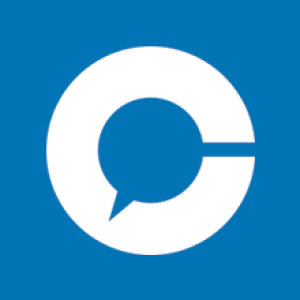
Sunday Apr 18, 2021
Can Business be a Social Enterprise - Cheif Clarence Louie
Sunday Apr 18, 2021
Sunday Apr 18, 2021
Ep 336 - Can Business be a Social Enterprise?
Guest: Chief Clarence Louie
In 2020, Osoyoos Indian Band Chief Clarence Louie was inducted into the Business Laureates of BC Hall of Fame. It was another recognition of the business successes that he and Band Council have developed. Since 1988, the Osoyoos Indian Band Development Corporation has focused on business development as a social enterprise.
Louie says, “These businesses are owned by the band and they are managed and run by Chief and Council with the sole purpose of creating opportunities for our members and generating revenue to support the community.” The band has 460 members and employs more than 700 people. “We have a job for every member of our band,” Louie emphasizes.
We invited Chief Clarence Louie to join us for a Conversation That Matters about his businesses, his strategies and how he manages his dual roles as Chief of the Osoyoos Indian Band and as head of the development corporation.
Please become a Patreon subscriber and support the production of this program, with a $1 pledge https://goo.gl/ypXyDs
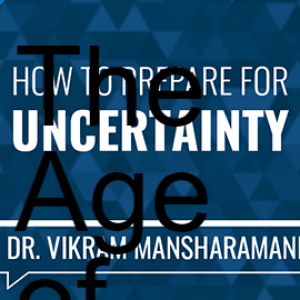
Tuesday Apr 06, 2021
The Age of Uncertainty -Dr Vikram Mansharamani
Tuesday Apr 06, 2021
Tuesday Apr 06, 2021
Ep 335 - The Age of Uncertainty
Guest: Dr. Vikram Mansharamani
When you cast your eyes out over the horizon, do you see storm clouds rising? When you do, what is your response? Do you rely on insights from experts and technology or do you think for yourself? Do you have a default reaction to threats or do you employ a multidisciplinary approach?
These are valid questions especially after the year we all have endured. Nothing is as it was, which begs the question – how do you prepare for what may be? According to Harvard lecturer Dr. Vikram Mansharamani, you have to connect dots and think for yourself. He says, “Generalists may be better suited to navigate ambiguous situations than specialists.”
The key, he says, is to learn how to anticipate the future, manage risk and spot opportunities. In his book, “Think For Yourself,” he urges a return to common sense. He says, “You have to look at each situation through a variety of lenses. Some are financial. Others include a technological perspective as well as changing demographics, to name a few.”
We invited Dr. Vikram Mansharamani to join us for a Conversation That Matters on how to navigate uncertainty.
Please become a Patreon subscriber and support the production of this program, with a $1 pledge https://goo.gl/ypXyDs

Monday Apr 05, 2021
Do Catastrophic Predictions Come True? - Dr Patrick Moore
Monday Apr 05, 2021
Monday Apr 05, 2021
Ep 334 - Do Catastrophic Predictions Come True?
Guest: Dr Patrick Moore
In the course of our lifetimes, we have been bombarded with dire warnings about the fate of the planet. In the late 60s, Paul Ehrilich’s book “The Population Bomb'' predicted the Earth would not be able to feed three and a half billion people. Today, there are more than 7.8 billion people and climbing. Ehrilich was wrong. Not only are we feeding more people, the percentage of people who are undernourished has been steadily falling since 1990.
In the 1970s, the news about climate indicated we were headed for another ice age. That didn’t happen.
The Maldives are supposed to be underwater by now, based on a 1988 prediction. That 30-year prediction was revised in 2015 to happen in 30 years from now.
In the early 2000s, polar bears were apparently on the brink of survival. National Geographic wrongly published a photo of an ailing polar bear with the headline, “This is What Climate Change Looks Like.” The magazine has since said it “went too far” with the caption. Recent population numbers of polar bears are up from 24,000 in 1984 to more than 26,500 at a minimum today.
Last year, we interviewed a scientist who was part of an expedition to the Gulf of Alaska in search of plastics in the ocean. His thesis was that plastics are impacting salmon in the Gulf of Alaska. Upon his return from five weeks of sampling, he was speechless. At first, he thought he had made a mistake. Months later, after reviewing his work and analysis, all he could say was that he didn’t find plastics in the Gulf of Alaska in the winter of 2019.
In January 2021 the Sahara Desert was blanketed with ice and recently it snowed in Madrid and Malibu, California. What is going on? Patrick Moore, one of the controversial environmentalists on the planet, says, “Predictions of invisible threats aren’t real.” He says we’ve been duped.
We invited Dr. Patrick Moore to join us for a Conversation That Matters about predictions of catastrophic threats.
Please become a Patreon subscriber and support the production of this program, with a $1 pledge https://goo.gl/ypXyDs

Monday Apr 05, 2021
Are Cows Accelerating Global Warming? - Dr Frank Mitloehner
Monday Apr 05, 2021
Monday Apr 05, 2021
Feb 5, 2021
Ep 333 - Are Cows Accelerating Global Warming?
Guest: Dr. Frank Mitloehner
Cows have rapidly moved into the crosshairs of climate change and diet. Dr. Frank M. Mitloehner of UC Davis says much – if not most – of what you think you know about ruminants and climate change is inaccurate. His findings align with those of climate scientist Dr. Myles Allen, an IPCC contributor and Oxford professor who says the global warming potential carbon equivalency formula applied to livestock is incorrect.
Both Mitloehner and Allen point to the impact a stable or declining herd has on methane production. Add in improving dietary and animal husbandry practices, along with methane capturing systems, and the picture in northern hemisphere countries is positive.
We invited Dr Frank Mitloehner to join us for a Conversation That Matters about cows, cattle, the environment and how we can’t live without ruminants.
Conversations That Matter is a partner program for the Morris J Wosk Centre for Dialogue at Simon Fraser University. The production of this program is made possible thanks to the support of the following and viewers like you.
Please become a Patreon subscriber and support the production of this program, with a $1 pledge https://goo.gl/ypXyDs
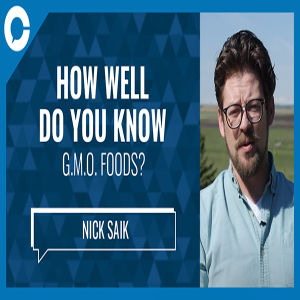
Monday Feb 15, 2021
Do you know GMOs? - Nick Saik
Monday Feb 15, 2021
Monday Feb 15, 2021
Ep 332 - Do you KNOW GMOs?
Guest: Nick Saik
Everything you eat has been modified.
When it comes to plants, fruits and vegetables, everything you put in your mouth has been modified one way or another. Cross-pollination, hybridization, open pollination, mutagenesis and genetic engineering all change the makeup of food.
These four methods are processes that can produce new strains of food – can. Won’t necessarily, but can. And when they do, they are accepted into the food supply after appropriate testing. These are shot-in-the-dark best guess tries. Some work; most don’t.
Mention genetics and for many, it is an out-of-bounds topic. “Franken-wheat” or “Franken-tomatoes” or corn or papayas from Hawaii. Yes, Hawaii, where three counties tried to enact laws forbidding genetically modified foods but were overruled by the state government and the courts.
The debate, the rules and the process of going into the lab and helping a plant or fruit fight off a virus or bacteria or be drought resistant is so onerous and expensive few companies are willing to invest their time and money.
As Nick Saik, the host of KNOW - GMO says, “It costs, on average, 10 years and a hundred million plus dollars to deregulate a crop.” He goes on to say, “The delay is largely driven by the public fearing these crops.” And these delays and the costs could very well mean we will never be able to grow the food billions of people will need.
The gap between perception and what his research was telling him led Nick to create a video series about GMOs. We invited Nick Saik to join us for a Conversation That Matters about GMOs and what we need to know about them if we hope to feed the world of 2050.
Please become a Patreon subscriber and support the production of this program, with a $1 pledge https://goo.gl/ypXyDs
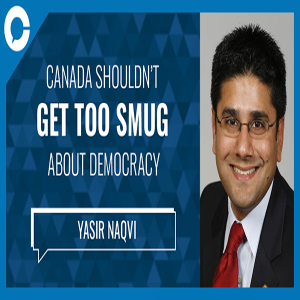
Saturday Feb 06, 2021
Canada Shouldn't Be Too Smug About Democracy - Yasir Naqvi
Saturday Feb 06, 2021
Saturday Feb 06, 2021
Ep 331 - Canada shouldn’t get too smug about democracy
Guest: Yasir Naqvi
The storming of Capital Hill in Washington D.C. on January 6, 2021 came as a shock. The storming of the Capitol Building seemed inconceivable in the United States and to many Canadians it seems even less likely that it could happen here. “Not so,'' says Yasir Naqvi, the CEO of Inclusion Canada and the former Attorney General of Ontario.
Naqvi points out, “Canadians are often smug when it comes to American politics. We like to believe that we are more progressive than our southern neighbours, that we could never elect our own Trump, that we are somehow better, less corrupt, nicer.” He believes “that thinking is more than ignorant – it’s dangerous.”
It’s dangerous because we can be blind to the threats that give rise to an insurrection such as was witnessed in the United States. The key elements to be aware of, according to Naqvi, are “a rise in alt-right media, the undermining of science and facts, violence against others and the chipping away of trust in public institutions.” All of these elements are present and active in Canada.
The responsibility of citizenship in a democracy is to debate in a civil manner, to endeavour to enhance society with courage, to seek justice and compassion. We all have that responsibility, which is to challenge misinformation, to defend the rights of all and to work through challenges in pursuit of better communities.
We invited Yasi Naqvi to join us for a Conversation That Matters about the state of democracy in Canada, the ever-present threats and our responsibilities as citizens.
Conversations That Matter is a partner program for the Morris J Wosk Centre for Dialogue at Simon Fraser University. The production of this program is made possible thanks to the support of the following and viewers like you.
Please become a Patreon subscriber and support the production of this program, with a $1 pledge https://goo.gl/ypXyDs
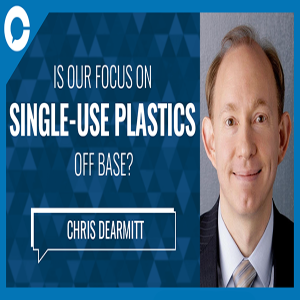
Friday Feb 05, 2021
Is our single use plastics focus off base? - Dr Chris DeArmitt
Friday Feb 05, 2021
Friday Feb 05, 2021
Jan 15, 2021
Ep 330 - Is our single use plastics focus off base?
Guest: Dr. Chris DeArmitt
“When it comes to single-use, we might be better off focusing on paper rather than plastic,” says leading plastics scientist Chris DeArmitt. He is the author of “Phantom Plastics,” a book that debunks the prevailing thoughts about plastics. He points out that the banks of Canada and England both studied plastic versus paper for the country's money and in both jurisdictions, the decision was to print plastic money rather than paper because it was better for the environment.
Heresy, you say! How can that be? DeArmitt claims, “Life cycle analysis is the answer. Plastic money has seven times the lifespan of paper money.” When looking at the total impact of paper money, the carbon footprint and environmental cost far exceeds that of plastic. DeArmitt starts by pointing to the weight of paper saying, “The extra fuel required to transport paper over plastic is just one element in the life cycle analysis of money. And then add in the impact of harvesting trees, mashing them into pulp and paper and the limited lifespan, and it all adds up to plastic being the best choice.”
DeArmitt continues, “Litter is created by people who can stop doing that by making better choices… When you attach value to plastic, it does not clog drains or end up in the sewer. The proof of that is in money. There are more than eight billion plastic bank notes printed each year and they do not get discarded.”
We invited Dr Chris DeArmitt to join us for a Conversation That Matters about plastics, the myths and misconceptions.
Conversations That Matter is a partner program for the Morris J Wosk Centre for Dialogue at Simon Fraser University. The production of this program is made possible thanks to the support of the following and viewers like you.
Please become a Patreon subscriber and support the production of this program, with a $1 pledge https://goo.gl/ypXyDs
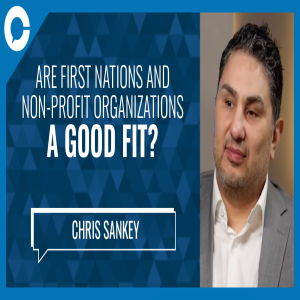
Saturday Jan 30, 2021
Are First Nations and NGOs a good fit? - Chris Sankey
Saturday Jan 30, 2021
Saturday Jan 30, 2021
Jan 8, 2021
Ep 329 - Are First Nations and NGOs a good fit?
Guest: Chris Sankey
Chris Sankey says, "It's time for NGOs to butt out of First Nations business. What they are doing is tantamount to environmental colonialism." Sankey wants outsiders to stay in their lane and stop pretending to speak for First Nations.
He says, "NGOs show up to run a campaign where it suits their interests and once they have thwarted a resource development they leave. And when they leave, they leave that First Nation doomed to further poverty."
Sankey says First Nations now have a place at the table and on the balance sheet of resource development. That place in Canadian history was not available to First Nations until landmark court cases recognized the inherent right to consult and participate in development on traditional lands.
Resource development for many First Nations provides access to economic opportunities that create jobs and support community infrastructure. These are the building blocks of an improvement in quality of life and self actualization.
Sankey says, "Now, along come these NGOs who have an agenda that, in essence, tells us to forego these opportunities and destine ourselves to continued poverty. I'd like them to stay out of our business."
We invited Chris Sankey to join us for a Conversation That Matters about why it is time for First Nations to speak up and tell others to butt out.
Conversations That Matter is a partner program for the Morris J Wosk Centre for Dialogue at Simon Fraser University. The production of this program is made possible thanks to the support of the following and viewers like you.
Please become a Patreon subscriber and support the production of this program, with a $1 pledge https://goo.gl/ypXyDs
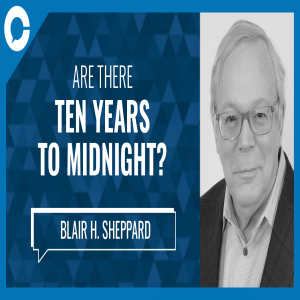
Friday Jan 29, 2021
Are there Ten Years to Midnight? - Blair H. Sheppard
Friday Jan 29, 2021
Friday Jan 29, 2021
Ep 328 - Are there Ten Years to Midnight?
Guest: Blair H. Sheppard
Blair Sheppard thinks big and from his vantage point, he says there are only “Ten Years to Midnight” – which is the title of his book that addresses four urgent global crises and the strategies needed to solve them. It is not a book he wanted to write. He didn’t seek out these crises. Rather they emerged as he travelled the globe, observing trends in India, Spain, the UK, the United States, along with a dozen other countries.
Sheppard is the former Dean of the Business School at Duke University and the Global Head of Strategy and Leadership at PricewaterhouseCoopers. He is an optimist by nature and he’s worried about our collective future. The reason he’s concerned is the scope of the challenges the world faces and the big thinking that is needed to address them by people with the power to make the necessary changes.
We invited Blair Sheppard to join us for a Conversation That Matters about the major issues facing us all and the insights, strategies and courage needed to address them.
Conversations That Matter is a partner program for the Morris J Wosk Centre for Dialogue at Simon Fraser University. The production of this program is made possible thanks to the support of the following and viewers like you.
Please become a Patreon subscriber and support the production of this program, with a $1 pledge https://goo.gl/ypXyDs

Friday Jan 29, 2021
Is he the Wayne Gretzky of pulse crops? - Murad Al-Katib
Friday Jan 29, 2021
Friday Jan 29, 2021
Ep 327 - Is he the Wayne Gretzky of pulse crops?
Guest: Murad Al-Katib
“Sustainable three-crop rotation” does not roll off your tongue, nor is it an idea that can be easily comprehended. Yet sustainable three-crop rotation is at the heart of a transformation in agriculture that started in Saskatchewan about 20 years ago.
What is sustainable three-crop rotation, you ask? They are cereal, canola and pulse crops. The first two, you’ve heard of. But pulse crops – what the heck are they? And why should we care?
The reasons to care are environmental, economic and security. First, environmentally: pulse crops, like lentils, affix nitrogen into the soil, which means the field does not have to lay fallow to rejuvenate. That, in turn, means a new crop can grow and while doing so, it captures carbon from the atmosphere and sequesters it. Both effects make pulses environmentally beneficial.
Economically, the value to the Canadian economy is in excess of three billion dollars a year and growing. That, in turn, leads to jobs and further economic growth. And the phenomenal success of AGT Terminals, headed by Murad Al-Katib, has increased the production of foods from pulses and increased food security in Canada.
Central to AGT’s success is science and technology. Al-Katib’s company employs more than 30 researchers who are not only growing an abundance of food, they are also producing and milling it in Canada – plant-based foods that produce protein rich foods that require less land and less water than traditional protein products.
Data, analytics, decision support, artificial intelligence, better cameras and drones are all a parts of the agriculture equation that are enhancing the ability of farmers to produce a bounty of food for a world of more than 9.5 billion people by 2050. The farms of today and tomorrow employ IT teams to help run efficient and sustainable businesses.
We invited Murad Al-Katid, the 2017 Ernst & Young World Entrepreneur of the Year, the man Professor Sylvain Charlebois calls the “Wayne Gretzky of pulses,” to join us for a Conversation That Matters - Food For Thought episode about the limitless possibilities in Canadian agriculture.
Conversations That Matter is a partner program for the Morris J Wosk Centre for Dialogue at Simon Fraser University. The production of this program is made possible thanks to the support of the following and viewers like you.
Please become a Patreon subscriber and support the production of this program, with a $1 pledge https://goo.gl/ypXyDs

